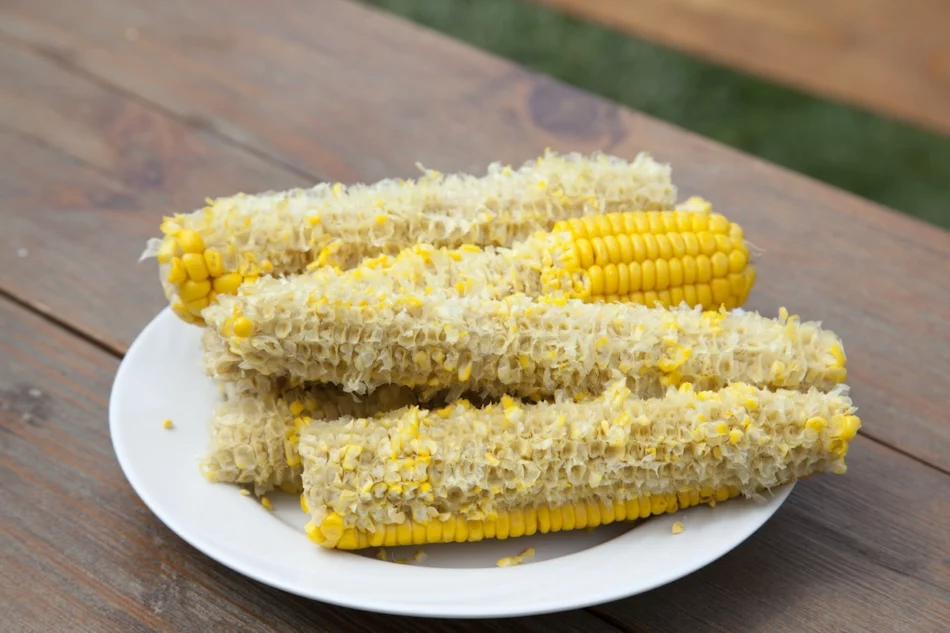When you finish enjoying sweet, buttery corn, your instinct might be to toss the cob—but don’t. Beneath its rough, woody surface lies a surprising source of wellness. From soothing your stomach to refreshing your home, corn cobs are far more than food waste—they’re a natural remedy, a sustainable ingredient, and a functional household tool.
Here’s how to transform corn cobs into healing teas, nourishing soups, and even natural air purifiers.

Top Health Benefits of Corn Cobs
1. Promotes Digestive Regularity
Corn cobs are high in insoluble fiber, which helps regulate bowel movements and ease constipation without irritating the gut.
2. Natural Detox Support
Boiled cob infusions may have diuretic and mild anti-inflammatory properties, helping the body flush toxins and reduce water retention.
3. Soothes the Stomach
Corn cob tea is particularly gentle, making it ideal for sensitive stomachs or post-meal bloating—especially in hot weather when digestion slows down.

4. Boosts Oral Health
Gargling with cooled corn cob tea or water may reduce gum inflammation and control bacteria due to its mild antimicrobial compounds.
5. Helps Hydration & Heat Recovery
Cold cob tea is naturally hydrating, replenishing fluids while cooling the body—a traditional remedy for heat exhaustion or summer fatigue.
6. Supports Lungs and Immunity
Warm corn cob tea has long been used in folk remedies to soothe the throat, improve breathing, and support overall immune defense.

Recipe #1: Corn Cob Tea – A Cooling, Gut-Friendly Tonic
Ingredients:
- 2–3 cleaned corn cobs (kernels removed)
- 1.5 to 2 liters of water
- Optional: honey, cinnamon, or lemon peel for flavor
Instructions:
- Clean the cobs thoroughly and cut them into 2–3 pieces.
- Boil them in a pot of water over medium heat.
- Simmer for 30 minutes until the water turns light yellow and aromatic.
- Strain, let cool, and enjoy either warm or chilled.
- Serving Tip: Add a dash of honey or a slice of ginger for flavor and extra health benefits.

Recipe #2: Corn Cob Soup – A Light, Immune-Boosting Comfort Food
Ingredients:
- 3 corn cobs (kernels removed and reserved)
- Corn kernels from the cobs
- 4–5 shiitake mushrooms (soaked and sliced)
- 1 small slice of ginger
- 2 beaten eggs
- 1 tbsp cornstarch + 2 tbsp water
- 2 liters of water
- Salt, pepper, and chopped green onions
Instructions:
- Simmer the cobs and ginger in water for 10 minutes to create a mild broth.
- Add mushrooms and continue simmering.
- Add corn kernels, cooking until tender.
- Drizzle beaten eggs while stirring gently to form silky ribbons.
- Thicken with cornstarch slurry if desired.
- Season with salt, pepper, and fresh green onions.
- Why It Works: The corn cobs infuse natural sweetness and minerals, while mushrooms and egg add depth and nourishment—perfect for kids, the elderly, or recovery meals.
Bonus: Use Corn Cobs to Purify Air at Home
Corn cobs have been shown to absorb indoor pollutants like formaldehyde, making them a natural, zero-waste air filter.
How to Use:
- Air-dry used corn cobs thoroughly (2–3 days in sunlight or oven-dried).
- Place in open containers around the house, especially in newly renovated rooms or near furniture.
- Replace every 1–2 weeks for continuous freshness.

Why Corn Cobs Deserve a Second Chance
Rather than tossing them, corn cobs can become a functional, nutritious, and sustainable part of your life. They help you:
- Reduce food waste
- Support digestion and detox
- Create nourishing recipes
- Naturally purify your home
And best of all? They cost nothing extra. Just remember to source pesticide-free corn and wash cobs thoroughly.
Important Reminder
- If you have a corn allergy or are sensitive to corn-based products, consult your doctor before consuming.
- Always wash cobs well, especially if not organic, to avoid ingesting chemicals or contaminants.
Final Thought:
Corn may be the main event—but the cob is a hidden wellness hero. Start saving your cobs, and unlock the full power of this humble kitchen leftover.
Disclaimer: This guide is for informational purposes only and does not replace professional medical advice. Always consult your healthcare provider before beginning any herbal remedy.





